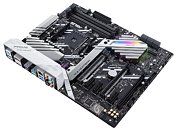- Joined
- Oct 9, 2007
- Messages
- 47,890 (7.38/day)
- Location
- Dublin, Ireland
| System Name | RBMK-1000 |
|---|---|
| Processor | AMD Ryzen 7 5700G |
| Motherboard | Gigabyte B550 AORUS Elite V2 |
| Cooling | DeepCool Gammax L240 V2 |
| Memory | 2x 16GB DDR4-3200 |
| Video Card(s) | Galax RTX 4070 Ti EX |
| Storage | Samsung 990 1TB |
| Display(s) | BenQ 1440p 60 Hz 27-inch |
| Case | Corsair Carbide 100R |
| Audio Device(s) | ASUS SupremeFX S1220A |
| Power Supply | Cooler Master MWE Gold 650W |
| Mouse | ASUS ROG Strix Impact |
| Keyboard | Gamdias Hermes E2 |
| Software | Windows 11 Pro |
This shouldn't really need to be spelled out, but AMD clarified that you can't have PCI-Express gen 4.0 running an upcoming Ryzen 3000 "Matisse" processor on older socket AM4 motherboards based on AMD 300-series and 400-series chipsets, and that the processor's PCIe root-complex will run at PCI-Express gen 3.0 speeds. AMD's official reason for this is that the older motherboards can't guarantee reliable signaling needed for PCI-Express gen 4.0 and hence the company decided to blanket-disable PCIe gen 4.0 for the older platforms. This statement was put out by Robert Hallock, senior technical marketing head for CPUs and APUs, on Reddit.
Unofficially, though, we believe there are technological barriers standing in the way of PCI-Express gen 4.0 on the older motherboards, the least of which are the lack of external PCIe gen 4.0-certified re-driver/equalizer components, and lane-switching on boards that split one x16 PEG link to two x8 links. There may be other less technical issues such as PCI-SIG certification for the older platforms. Intel faced a similar challenge with its 3rd generation Core "Ivy Bridge" processors, which introduced PCI-Express gen 3.0 to the mainstream desktop platform, and were backwards-compatible with Intel 6-series chipset (eg: Z68 Express). The older 6-series motherboards could only put out PCIe gen 2.0 with the newer processors.

View at TechPowerUp Main Site
Unofficially, though, we believe there are technological barriers standing in the way of PCI-Express gen 4.0 on the older motherboards, the least of which are the lack of external PCIe gen 4.0-certified re-driver/equalizer components, and lane-switching on boards that split one x16 PEG link to two x8 links. There may be other less technical issues such as PCI-SIG certification for the older platforms. Intel faced a similar challenge with its 3rd generation Core "Ivy Bridge" processors, which introduced PCI-Express gen 3.0 to the mainstream desktop platform, and were backwards-compatible with Intel 6-series chipset (eg: Z68 Express). The older 6-series motherboards could only put out PCIe gen 2.0 with the newer processors.

View at TechPowerUp Main Site



